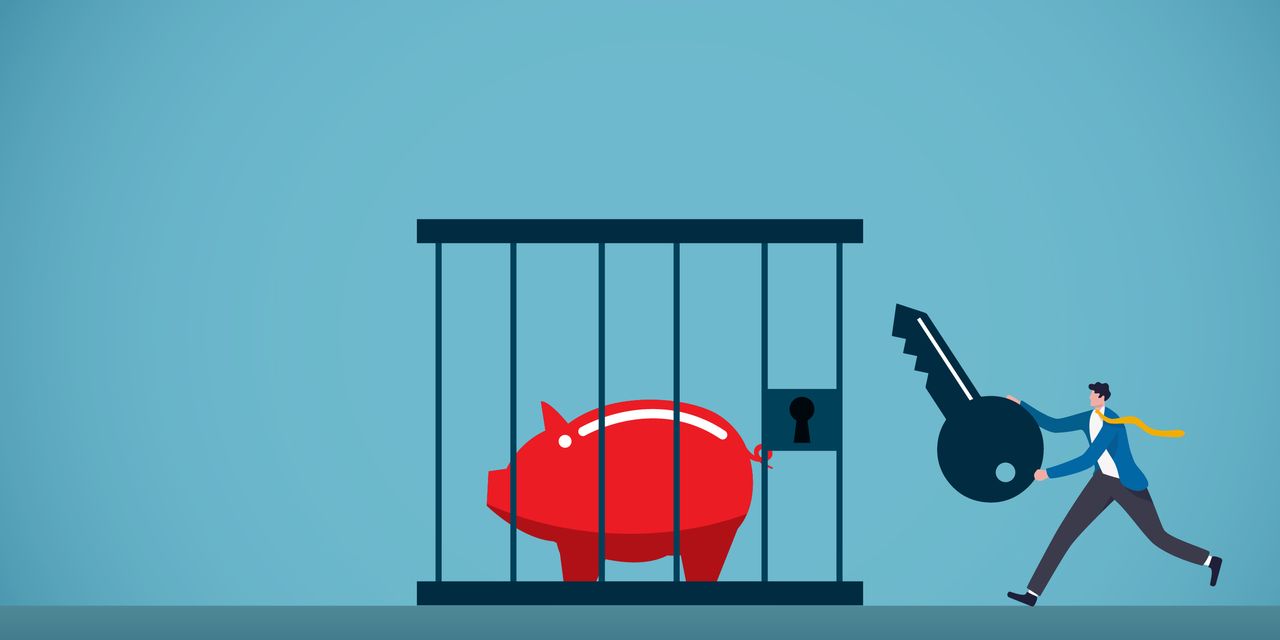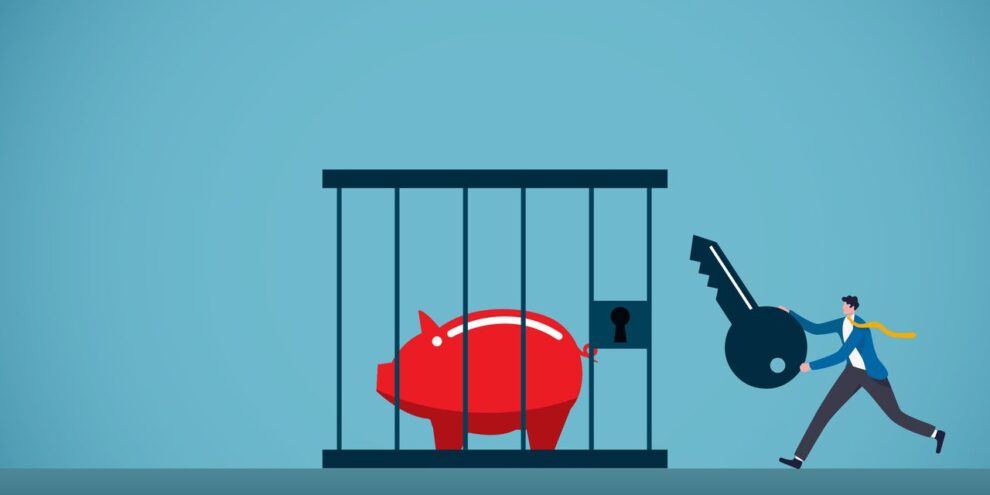
Inflation is taking its toll on people’s emergency funds.
The share of workers who say they are living paycheck-to-paycheck has surged among middle- to high-income earners — 63% and 49%, respectively — up from 57% and 38%, respectively, a year ago, according to an independent survey of almost 4,000 workers released this week by online loan specialist LendingTree. Overall, 65% percent of employed consumers were living paycheck-to-paycheck in September 2022 — up from 60% a year ago.
Meanwhile, the personal savings rate — savings as a percentage of disposable income — fell to 3.3% in the third quarter from 3.4% in the prior quarter, the government said Thursday, the lowest level since the Great Recession 8th. Adjusted for inflation, savings are down 88% from their 2020 peak and 61% lower than pre-pandemic. (Personal savings hit $629 billion in the second quarter of 2022, down from $1.41 trillion in the second quarter of 2019.)
Millions of Americans face rising prices on essential goods and services such as food and rent as their savings are drying up after a post-pandemic spending splurge. On Wednesday, Kraft Heinz Co. KHC, +2.45% said its third-quarter prices were 15.4 percentage points higher than a year before. National retail sales rose 8.2% on the year in September. “There has certainly been some pent-up demand from the pandemic,” said Larry Pon, a financial planner based in Redwood City, Calif.
To help retain and attract workers, some major companies — including Starbucks SBUX, +2.67% and life-insurance company Transamerica — are offering “savings programs” and “emergency savings accounts.” There appears to be genuine cause for concern: Only 68% of people said they had $400 in emergency cash or its equivalent, according to the most recent survey on the issue by the Federal Reserve, although that figure that has been steadily climbing from 50% in 2013.
“‘Households are spending more, not as much because they want to, but because they have to with increased costs for essential items.’”
But there’s another reason for the apparent dearth of emergency funds. “Because of the spike in inflation, Americans’ monthly expenses have outpaced their personal income growth,” Kristi Rodriguez, senior vice president of Nationwide Retirement Institute, told MarketWatch. “This suggests that households are spending more, not as much because they want to, but because they have to with increased costs for essential items such as gasoline, groceries and healthcare.”
A drop in personal savings is unwelcome, experts say. “Many families are at risk of depleting their cash reserves, which is particularly concerning considering most signs point to a recession in 2023,” Rodriguez added. “However, we are seeing incomes boosted by rising wages and low risk of default for key financial debts such as their mortgage, car loan, etc. If a recession does occur next year, there will likely be some job losses with some families falling even further behind.”
People are stuck between rising prices and rising interest rates — with the battle drum of recession growing ever louder. Wages increased at a 5.7% annual rate in the second quarter. That’s less than the current 8.2% annual inflation rate. In addition, average wages in the bottom two quartiles of the income ladder have been growing faster than wages in the top two quartiles over the past 12 months, according to recent data from the Federal Reserve Bank of Atlanta.
Given the economic outlook, workers may have limited options. “With inflationary pressures not expected to subside anytime soon, living paycheck-to-paycheck has become the norm,” Anuj Nayar, LendingClub’s financial health officer, said. “Many are pessimistic about their odds of increasing their paycheck by switching jobs, and some households will become more vulnerable to swings in labor-market conditions. This could cause many to struggle with the upcoming holiday season.”
Consumers can take action
Cash-strapped Americans are disproportionately concentrated in the retail and services industries, Nayar added. In fact, 26% of these consumers have more than one employer. Fewer than 4 in 10 consumers believe their current jobs meet their wage expectations. While workers often jump ship as a way to bump up their salary, the report shows optimism about finding a new job that fits both wage demands and an employee’s qualifications is generally low.
Rob Seltzer, owner and president of Seltzer Business Management Inc. in Los Angeles, recommends people start to cut non-essential spending. “They need to be proactive in their budgeting and look where they can cut back,” he said. “It’s a lot cheaper to cook for yourself than it is to go out. If you go out less, that can help with saving cash. If you can pay yourself first when you get paid, and automatically transfer money to a savings account.”
Mingli Zhong, a research associate at the Urban Institute, a Washington, D.C.-based think tank, advises consumers — whenever possible — to set aside a small portion of income for a rainy day. “Invest a small fraction of your income in a no-cost or low-cost index fund with a long-term return higher than inflation,” she said. “Alternatively, save your income in a high-yield savings account. If possible, delay applying for a mortgage since the mortgage rate is at its record high.”
With rising prices due to supply shortages and companies being forced to increase wages to attract workers, she acknowledges that many people cannot cut back on basic needs. “They continue to pay high prices until many of them have exhausted their savings. We ended up getting into another recession,” she said. “More households with little savings would have little cushion against a recession. They will have to rely heavily on another round of social benefits.”
“‘Invest a small fraction of your income in a no-cost or low-cost index fund with a long-term return higher than inflation.’”
Some experts believe that it’s bad timing that so few people appear to have emergency funds. “The magnitude of this drop in personal savings tells us that middle- and lower-income American households are living in a precarious financial situation and need help,” Rodriguez told MarketWatch. “It is worth noting that a drop in savings or a recession can significantly impact mental health, as we know that a top stressor for most individuals is finances.”
Rodriguez has a five-point plan to increase emergency funds: First, prioritize retirement savings even while managing expenses and debt. The IRS recently increased the amount people can put into 401(k)s, 403(b)s, 457, and TSP retirement accounts. Second, contribute to your retirement plan — most people don’t until they reach 31 years of age, according to research from the nearly 2.5 million defined-contribution plan Nationwide participants.
Third, prioritize preventative care. Nationwide’s Retirement Institute Health Care survey found that 10% of respondents canceled or postponed plans to see a specialist or get an annual physical in the past 12 months due to inflation. Fourth, leverage Health Savings Accounts (HSA). While half of employed adults (49%) have access to an HSA through their employer, only 30% participate in or contribute to one. And, fifth, If you can afford it, Rodriguez added, find a financial professional.
If there is a recession afoot, not everyone got the memo. “Last weekend, I was at a large outlet mall, and it may have been the most crowded I have seen,” Larry Pon told MarketWatch. “You can certainly tell by the full parking lot. The people were not just browsing, most had shopping bags of merchandise. There were lines to get into the stores. There were lines to check out.” But, he added, one should never forget budgeting 101. “You still need to build up your emergency fund.”
Related:
U.S. economy grows 2.6% in the third quarter — but recession worries aren’t going away
‘We’re seeing buyers backing out’: Sellers slash home prices in response to weakening housing market






